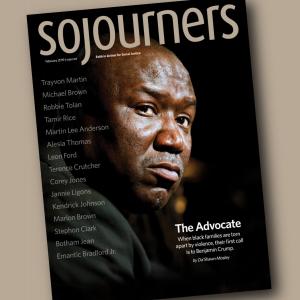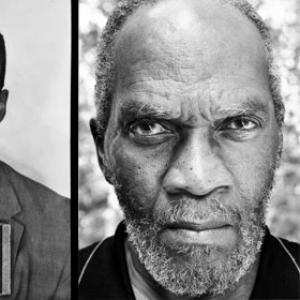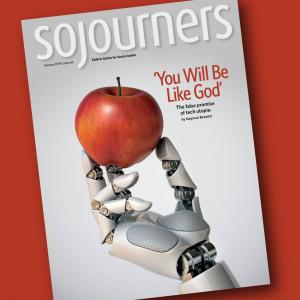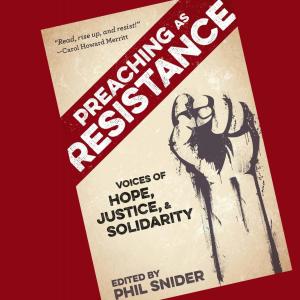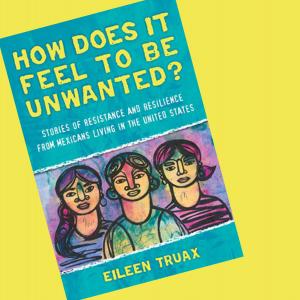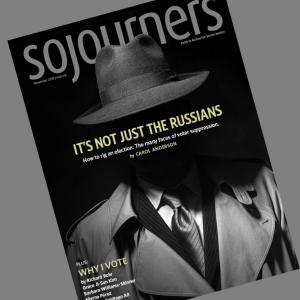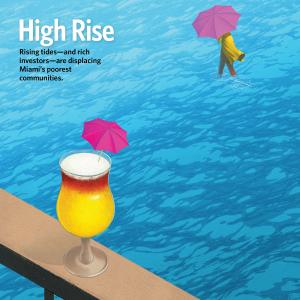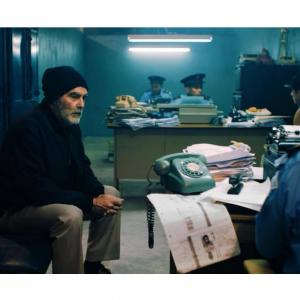Posts By This Author
From the Editors: The Church’s Problem With Sensuality
Blame it on the apple, Augustine, or purity culture, but many churches blush when it comes to body parts, especially naked ones.
“IT'S HARD TO imagine the average evangelical church embracing Mutesa’s colorful portraits of nude black joy,” writes Faith-Marie Zamblé in her profile of the young photographer whose work is rippled with laughter, face paint, and bare skin. Though the mood of Mimi Mutesa’s work is more exuberant than explicit, Zamblé is right: Blame it on the apple, Augustine, or purity culture, but many churches we know—evangelical or otherwise—blush when it comes to body parts, especially naked ones. Ever notice how crucifixes often have Jesus wearing a loincloth despite scripture’s insistence he was stripped?
We suspect Christian jitters around nudity are rooted in fear that naked bodies will arouse unholy sexual thoughts. But as Lutheran pastor Nadia Bolz-Weber points out, the church’s tendency to couple sexuality and sin has led to a sense of shame that many Christians find hard to shake. “I wonder how we could begin to honor sexual pleasure as something that can connect us more deeply to ourselves and others and God, yet still speak the truth about the ways in which our behaviors around sex can also do the opposite,” she writes in “Honor Thy Sexual Pleasure?” an excerpt from her forthcoming book, Shameless: A Sexual Reformation.
New & Noteworthy: February 2019
Four February culture recommendations from our editors.
Freedom Ride
The expanded edition of Breach of Peace: Portraits of the 1961 Mississippi Freedom Riders revisits a pivotal civil rights campaign. Filled with mugshots and recent interviews of several riders who were arrested in Jackson, Miss., Breach of Peace honors a historic act of protest. Vanderbilt University Press
One Body, Many Parts
Together at the Table: Diversity Without Division in the United Methodist Church, by Bishop Karen P. Oliveto, the UMC’s first openly LGBTQ bishop, is timely as the denomination nears a potential split over sexuality. Oliveto outlines how her denomination can remain whole. Westminster John Knox Press
Letters: February 2019
Letters to the editors from Sojourners readers.
Molech and Herod
A profound thank-you for Rose Marie Berger’s powerful column, “No More Cover-Ups,” in the December 2018 issue. It is a heroic, necessary, and epiphanic piece: I must have read it a score of times. As a cradle Catholic who never left Holy Mother Church, I wish you would send it to USCCB.org for the bishops to read. I was particularly struck by your bringing in Molech and Herod. Kudos to you for saying Catholics helped elect Herod to the presidency. I am quoting you all over the place: God bless you for such a spirited and enlightened essay.
Philip Kolin
Hattiesburg, Mississippi
From the Editors: The Dark Side of Tech
From iPhones to Idolatry.
"WE LIVE AS if the connections provided by digital technologies are vital,” writes Gaymon Bennett in the cover story, “and indeed we have made them so.”
Guilty as charged. Hang around the Sojourners office long enough and you’ll hear stories about how we used to keep a list of our subscribers in a shoebox and write articles on typewriters. But those days are done: Today our office hosts a congregation of laptops, tablets, screens, cameras, and smartphones that we need to access databases, send messages, and update our website. When a network upgrade happens to knock out the Wi-Fi, we all go home because, well, how could we work?
New & Noteworthy: January 2019
Four January culture recommendations from our editors.
In the Key of Policy
Neneh Cherry's effortless vocals and impressionistic lyrics reverberate with honesty in her fifth album, the personal and provocative Broken Politics. Complex, multilayered instrumentals featuring harp, brass, and steel drum form an unexpected backdrop for songs about refugees, women's rights, and gun violence. Small Supersound/Awal Recordings
Protest 101
How to Read a Protest: The Art of Organizing and Resistance explores the evolution of mass demonstrations in America since the 1963 March on Washington. Drawing on 30-plus years as a grassroots organizer, L.A. Kauffman sheds new light on how and why protests work. University of California Press
Letters: January 2019
Letters to the editors from Sojourners readers.
Big Brother Bias
It is disappointing to read “Under Ortega, Nicaragua Explodes,” by Eric L. Olson (November 2018), because of its one-sided nature. To rely on “an expert on U.S. policy on Latin America ... [who] lives in Washington D.C.” rather than on the voices of fellow Nicaraguan Christians embroiled in the current situation is uncharacteristic of Sojourners. Is it “big brother’s” spin on events that we take at face value, or do we seek to hear from sisters and brothers from the underside? Given the history of multiple CIA-instigated coups in Latin America, doesn’t the claim by some Nicaraguans that the recent troubles are the result of a CIA-sponsored coup attempt—taking advantage of initially nonviolent protests of unpopular policy changes—deserve a fair hearing? One would hope that Sojourners would join with Nicaraguan Christians in prayer and accompaniment rather than side with U.S. policy.
Doug Wingeier
Asheville, North Carolina
New & Noteworthy: December 2018
Four December culture recommendations from our editors.
Power of the Word
Preaching as Resistance: Voices of Hope, Justice, and Solidarity , edited by Phil Snider, is a collection of 30 sermons that confront forces of injustice and authoritarianism and proclaim gospel hope. Contributors include Wil Gafney, Jeff Chu, José F. Morales Jr., and Sojourners’ own Layton E. Williams. Chalice Press
Love and Community
In Redeeming Dementia: Spirituality, Theology, and Science, Dorothy Linthicum and Janice Hicks offer insights on a theology of the human person to empower people of faith to better embrace and advocate for those with dementia. Includes stories of innovative programs in churches and care facilities. Church Publishing
Letters: December 2018
Letters to the editors from Sojourners readers.
Football Is All Wrong
Bradford William Davis’ article about football ( “A Deal with the Devil,” September-October 2018 ) has it right! Football is not only unhealthy for kids’ bodies, it’s also unhealthy for their psyches. Football exemplifies all that’s wrong: It’s “won” through hurting opponents more than they hurt you, it’s full of trash talk, and those who are proficient in it proclaim themselves deities, expecting lionization and abusing others.
Horace Brown King
Binghamton, New York
From the Editors: An Experimental Church
There's room for progress in old models of Christianity and social justice.
MAYBE YOU’VE NEVER noticed it, snuggled up there under our logo, on the cover of every issue: “Faith in action for social justice.” In magazine-speak, this slip of text is called the “tagline,” a snappy description of what the magazine is all about, and our tagline is a pretty good summary of what we try to do in Sojourners: faith, action, social justice—words that convey our call to imitate Jesus’ abiding love for those on the margins.
New & Noteworthy: November 2018
Four November culture recommendations from our editors.
Life Stories
In How Does It Feel to Be Unwanted? Stories of Resistance and Resilience from Mexicans Living in the United States, LA-based (and Mexico City born)journalist Eileen Truax responds to rampant xenophobia with 13 profiles that highlight ways Mexican immigrants have overcome exclusion over the past 30 years. Beacon Press
Prophetic Compassion
On his new album, Nothing Like the Rain, singer-pianist-songwriter Ken Medema’s soaring voice, storytelling gift, and deep compassion deliver songs infused in turn with praise and scriptural wisdom. He lifts up stories of the broken and brokenhearted, invoking the call to both justice and mercy. Brier Patch Music
Letters: November 2018
Letters to the editors from Sojourners readers.
Letters to the editors from Sojourners readers.
From the Editors: Voting Counts
But it's only one form of resistance.
HOW MANY WAYS can you say “resist”? In recent issues, we’ve urged people of faith to “challenge,” “subvert,” and “defy” the leaders and systems that run counter to Jesus’ message of abundance, inclusion, and love. We’ve shared stories of faith-fueled ways to “protest, “persist,” and “persevere.” And on more than one occasion, we’ve indulged in the old prophetic standby: “Speak truth to power.”
But the best synonyms for “resist” aren’t in a thesaurus. They’re words like “organize,” “accompany,” and, as we explore in this issue, “vote.” “Voting is simply the easiest part of the whole process for making positive change,” explains Randy Woodley. We agree: Voting should be easy, though as Carol Anderson explains in “It’s Not Just the Russians,” some officials are intentionally restricting voting access, especially for people of color. So don’t be tempted to think your vote is meaningless; it’s the very power of voting that such efforts seek to curtail. If you read nothing else in this issue, read this: Check your local voting guidelines and ensure you cast your ballot on Nov. 6.
New & Noteworthy: September/October 2018
Four September/October culture recommendations from our editors.
Singing in Exile
On A Liturgy for the Perseverance of the Saints, Taiwanese-American artist SueAnn Shiah reimagines hymns “for those who have been driven out of the church because of their race, gender, or sexuality.” With warm vocals and spare arrangements, Shiah invokes hope for those currently “stranded in the wilderness.” sueannshiah.bandcamp.com
Faith and Imagination
In A Light So Lovely: The Spiritual Legacy of Madeleine L’Engle, Sarah Arthur digs deep into the personal journey of the influential and sometimes controversial A Wrinkle in Time author, revealing what L’Engle can continue to teach us. Zondervan
Letters: September/October 2018
Letters to editors from Sojourners readers.
Letters to editors from Sojourners readers.
Turning Off the Friday Night Lights
Injustice anywhere, including on the fields of competition, cries out for response.
FORMER SAN FRANCISCO 49ers quarterback Colin Kaepernick was presented Amnesty International’s Ambassador of Conscience award this spring—previous winners have included Nobel Prize winners such as Nelson Mandela and Malala Yousafzai—for “his refusal to ignore or accept racial discrimination.” Kaepernick’s “take a knee” protests against police violence sparked a movement, across football and other sports, and they rest upon a rich tradition of athletes who have stood up for justice in the broader society.
Our cover feature this month looks at one of the pre-eminent justice issues for the players themselves, particularly in football: brain injuries. We talked with Dr. Bennet Omalu, the forensic pathologist who discovered pervasive brain trauma in NFL players. Omalu, whose research on chronic traumatic encephalopathy, or CTE, was chronicled in the 2015 Will Smith movie Concussion, argues in his latest book, Brain Damage in Contact Sports, that no child under 18 should play football.
Letters: August 2018
Letters to the editors from Sojourners readers.
Letters to the editors from Sojourners readers
New & Noteworthy: August 2018
Four culture recommendations from our editors.

Image via Cora Edwards Photography/ Facebook
Time to Test
The documentary film I Am Evidence sheds light on the growing number of untested rape kits in the U.S. Featuring testimonies of survivors, prosecutors, and advocates, the documentary investigates why this backlog exists and calls attention to those fighting for justice. HBO
Beyond Redemption?
Fifteen years ago, Bryan Bliss witnessed an execution that propelled him to seminary, a stint teaching classes at correctional facilities, and, ultimately, into writing We’ll Fly Away. This young adult novel tells the story of two friends, Luke and Toby, through Luke’s letters from death row. Greenwillow Books
Holy Grief
We cannot divorce the gospel—Jesus’ suffering and redemption—from the history of violence against black people.
EARLIER THIS YEAR, we lost theologian James H. Cone. “Yes, he was a world historical figure in contemporary theology, no doubt about that,” said professor Cornel West at Cone’s funeral, “a towering prophetic figure engaging in his mighty critiques and indictments of contemporary Christendom from the vantage point of the least of these ... But oh,” West added. “I think he would want us to view him through the lens of the cross—the blood at the foot of that cross.”
More than any other theologian, Cone taught us that we cannot divorce the gospel—Jesus’ suffering and redemption—from the history of violence against black people in the U.S. “Until we can see the cross and the lynching tree together, until we can identify Christ with a ‘recrucified’ black body hanging from a lynching tree, there can be no genuine understanding of Christian identity in America,” wrote Cone in The Cross and the Lynching Tree, “and no deliverance from the brutal legacy of slavery and white supremacy.”
The same week Cone died, the Equal Justice Initiative opened the National Memorial for Peace and Justice in Montgomery, Ala., the nation’s first memorial dedicated to the more than 4,400 victims of racial violence, including lynching, between 1877 and 1950.
New & Noteworthy: July 2018
Four July culture recommendations from our editors.
Dignity in Displacement
Struck by the tragic stories of immigrants trying to enter eastern and southern Europe, Patrick Chamoiseau, a French author from Martinique, explores what it means to be a global community in a time of mass displacement in Migrant Brothers: A Poet’s Declaration of Human Dignity. Yale University Press
Silent Grief
Based on real events, September (originally released as Septiembre, Un Llanto En Silencio) depicts the coming-of-age of Theresa, a young girl who loses her hearing during a guerrilla terrorist bombing in Guatemala. Guatemalan director Kenneth Müller captures Theresa’s struggle as she navigates a grieving nation. Netflix
Letters: July 2018
Letters to the editors from Sojourners readers.
Seeking Alternatives
David LaGrand’s commentary “Imprisoned by Poverty” (May 2018) calls attention to an issue with our justice system, namely how bail can create severe problems for people who cannot come up with the necessary funds. This leads me to a practical question. We often hear reports of model bills that the American Legislative Exchange Council is presenting to state legislatures, trying to get undesirable policy made into law. My question is: Is there a good alternative to ALEC?
